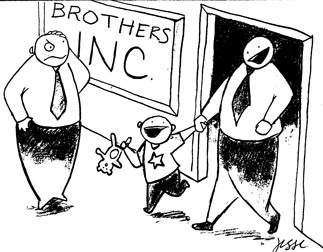
So, You’re in the Family Business… by Paul Karofsky
Sam: Look, Robert, this is getting to be ridiculous. When your oldest daughter wanted to come into the business, I never gave you an argument. She was focused on marketing and we needed her help. But now you want your other two kids to come in also?
Robert: Sam, we’ve been brothers-in-law and partners for over twenty years. What’s the big deal? I know you became a father later in life and won’t face this for another twenty years, but if you were in my situation, I’d welcome your children with open arms. Family is family, right? What are we working for if it’s not to build something for the kids? I can’t believe you’re giving me a hard time about this.
Sam: What do you think they are they going to do? Are we supposed to make up jobs for them just because they want to come in? The articles I’ve read say that children should gain experience outside the family business. At least let them go get a job somewhere else first.
Robert reflects, “I don’t understand him. Sam was always tough as nails, but I thought he was a good uncle. I know he cares about my kids. After all, they’re his sister’s children, too. If he didn’t mind when the first came in, why would he mind now? The outside job market is impossible. Especially for well-rounded kids with a liberal arts background. We can find a position for them in the business, or at least shift a few people around to make some room.”
Sam considers his conversation with Robert. “This guy’s unbelievable, he thinks this is his business and not ours. For him, the business is simply an extension of his family. For me, the business is the business. He might have had one daughter who was capable, but I don’t know about the other two. And who cares if they have college degrees? It seems like half the world has them today. Robert used to be so mellow and go along with most of what I wanted. But his attitude seems to have changed when my daughter was born. Now it seems like he gives me an argument over everything. Maybe he’s disappointed now that I have an heir and the whole business won’t ultimately go to his side of the family. Would Robert really feel the same way if my child wanted to come in? Or is he trying to stack the deck in his own favor early on?”
What’s going on…
Both Robert and Sam are raising valid concerns. One major obstacle is their lack of understanding of each other’s perspective. From Robert’s viewpoint, the role of the business is to support the family, to be a source of employment to those family members who desire it. If this means modifying the business to accommodate family members, then so be it, especially if those family members are his own children with dim prospects of alternative employment. Robert may also have mixed feelings about Sam’s child, believing at one point, that the business might well have ultimately gone to his children alone. He may be trying to secure positions for his children for the future.
Since his own child was born, Sam has seen a change in Robert. Sam now appears skeptical of Robert’s motives as a formerly compliant acceptance of Sam’s wishes is now met with challenge. Sam is clear about his own vision of the business as an independent entity which the family must serve in order to preserve success. He believes that Robert sees the business as a tool to be modified and adjusted to serve the family.
What should the family do…
The brothers-in-law need to continue their discussions with the understanding that there are no “rights” and “wrongs” here. Both Sam’s and Robert’s views of “what the business should be” are valid and reasonable, though they may not be compatible.
Some “fence mending” is also in order. It sounds like both may have unresolved issues around Sam’s late-in-life fatherhood and their own expectations for next generation ownership. Buy-sell agreements need to be reviewed and estate plans should be shared. Keeping secrecy and surprises to a minimum will lessen anxiety for all.
Robert and Sam must address contingencies beyond those covered by an estate plan and a partnership buy-sell agreement. They resolve succession plan questions only under the circumstances of the death of one partner. What happens if both live a long time? Is maintenance of the partnership in their best interests? Is it best for their families? Is it best for the business? Addressing these issues can raise some penetrating questions and concerns, so be prepared to ask for some help.
Just as “exit” issues need to be discussed, so, too, do “entry” requirements. The partners need to agree on criteria for the entry of family members. Must they meet educational requirements? What about working “outside” first? Should a job opening exist in advance or will the company make special arrangements for family members? What about salary and supervision?
The relationship of brothers-in-law is unique and complex, demanding special understandings and tolerances for difference. And silent expectations can put family businesses at risk when they are not met. Full and open dialogue, before the issues reach crisis status, is critical to maintaining a healthy family and a healthy family business.
Paul Karofsky was president of his family’s third generation business. He completed graduate studies at Harvard University doing research in family communication styles. Paul is Executive Director Emeritus of Northeastern University’s Center for Family Business and facilitates its Leadership Development Forum. He is the Founder and CEO of Transition Consulting Group, Ltd and is a frequent speaker and resource to educational institutions worldwide. Paul consults to family enterprises and can be reached at Paul@FamBizConsulting.com or 561-626-1110.
Copyright © 2010 Transition Consulting Group, Ltd. All rights reserved.
